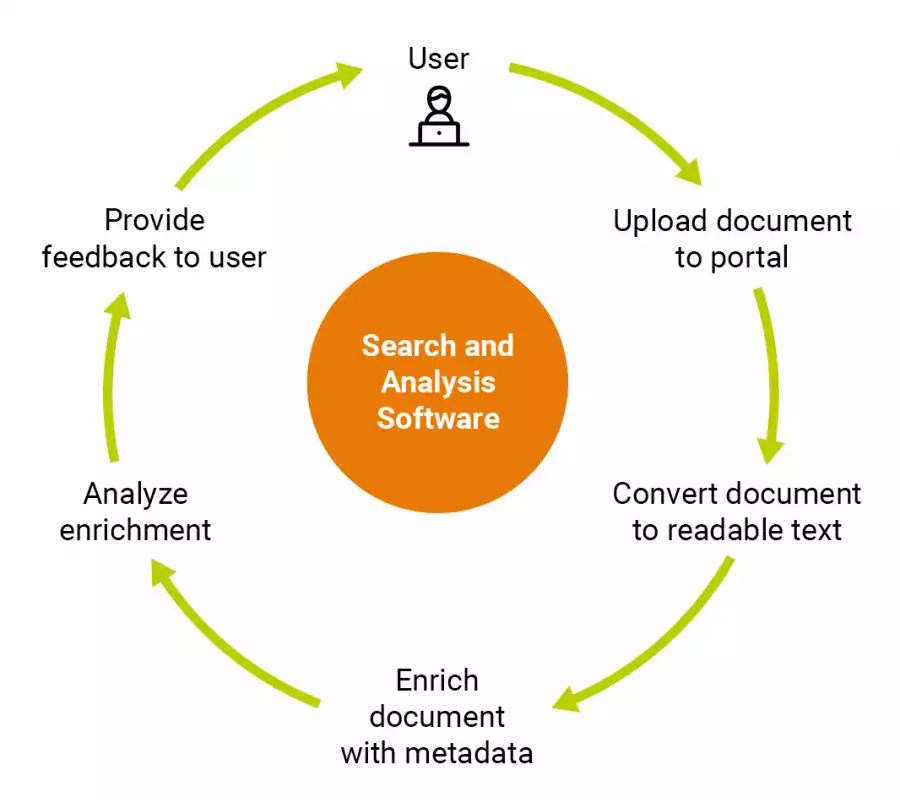

02.12.2020 | Blog AI accelerates and optimizes business processes
IntraFind's iFinder is an enterprise search software and thus an instrument to quickly find and link information in a company's data stock. The data sources are unstructured (e.g. wikis, email systems) and structured (e.g. ERP or CRM systems); they are internal (e.g. file shares) or connected external data sources (e.g. specialized information databases).
The increasing use of Artificial Intelligence considerably expands the field of application of such modern search and analysis solutions. They are able to categorize content thematically, sort data automatically and recognize relationships between data. For this purpose, they are equipped with a comprehensive AI technology stack consisting of machine learning as well as rule-based, linguistic and semantic processes.
Wherever AI is used, people can be supported. Standardized, often unloved and time-consuming tasks are taken over by the software. The human being can concentrate on activities that require his human intelligence. Thus, entire processes in companies and authorities can be optimized with AI-based search and analysis tools. Here are some examples:
1. Checking applications faster. Through automatic text classification and Natural Language Processing (NLP), intelligent search software can automate the pre-qualification of forms and applications in government agencies or companies. Applications submitted to application portals no longer need to be checked by humans for consistency and completeness. This work can be done by AI instead. Applicants are then already notified during data entry if documents need to be corrected or supplemented. Employees of the authority now only have to process complete, correct applications, which speeds up the application process. The AI takes care of checking for completeness - the work that requires human intelligence and technical know-how is done by humans.
2. Sorting and forwarding documents by categories. The automatic sorting of documents based on machine learning processes relieves employees and creates freedom to perform other tasks. From large volumes of data, the system is able to identify categories into which the data can be sorted. Machine Learning is used in practice, for example, for the thematic recognition and sorting of content in order to better control it in workflows. For example, incoming e-mails in a company's info@ inbox can be automatically classified and routed to the mailboxes of the relevant departments. It is even possible to send automatic replies with further information.
3. Faster response to support requests. Service and support staff can use a central search function to find information quickly and easily across all data sources - be it service manuals stored on the intranet or spare parts catalogs available in special service information systems. As a result, they no longer have to navigate to each system individually and deal with different operating techniques. Using AI-based content analytics functions, they can go beyond a pure full-text search to find relationships between facts. Text mining methods help to extract content from documents, such as product name, product number or product category, assemblies or components. These can also be offered to service employees as filters, which they can use to quickly narrow down the documents when searching for specific error images. This enables the employees to provide their customers with much faster support.
4. Evaluating contracts and documents faster. AI-based software as an intelligent reading aid enables large quantities of contracts to be thinned out according to specific clauses in less time. Based on modern machine learning methods, clauses and important data points in contracts or tenders can be recognized and extracted for targeted examination, risk analysis, commenting and processing. The AI-based software is already pre-trained for many purposes, but can be learned quickly and intuitively via simple user feedback. Specialist lawyers, for example, save a lot of time and enormous resources with this intelligent reading aid, as they no longer have to read contracts individually and manually mark their relevant passages. They can devote more time to their core tasks and minimize the risk of overlooking crucial passages.
5. Optimizing applicant selection. An intelligent applicant search in an HR system can accelerate the personnel recruitment process in companies or recruitment agencies. The AI-based software automatically identifies knowledge and skills in CVs and matches them with job profiles of open positions. In addition, HR employees are given the opportunity to search for required qualifications via free text and filter mechanisms and thus quickly find suitable applicants. This speeds up the recruitment process considerably.
Conclusion: Sensibly used artificial intelligence will not replace employees, but rather assist them and relieve them of standard tasks. If the employees can use it to speed up their work and they can devote more time to demanding topics, the entire organization will benefit.
Related Articles


Case Study: Bizerba - Better Service thanks to Fast Search

Product Deep Dive: Intelligent Contract Analysis with Legal Tech
The author
Franz Kögl

